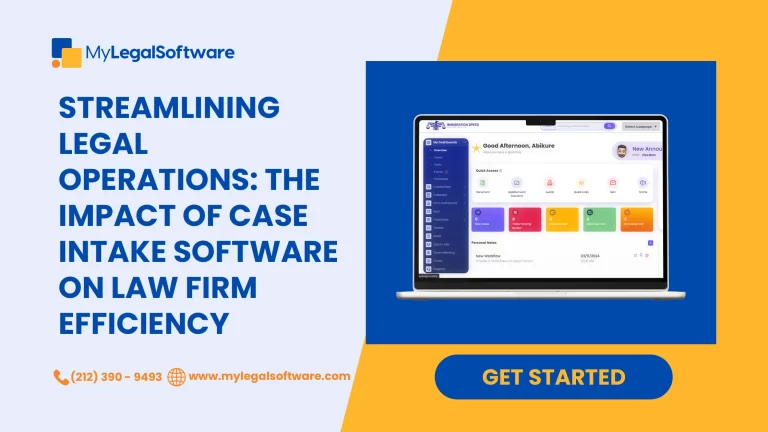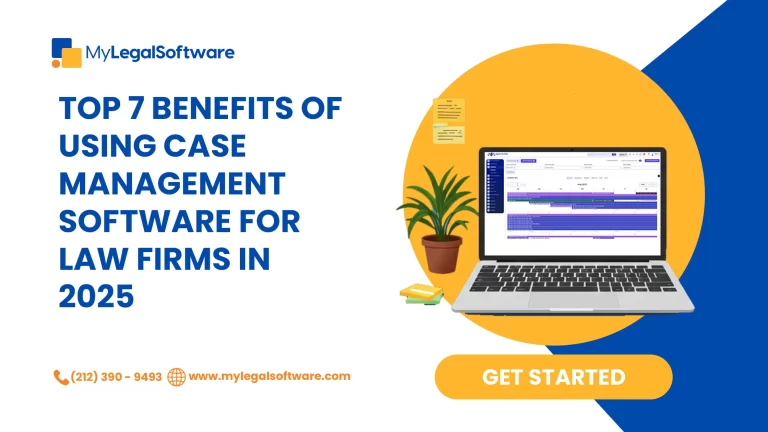The Role of Cloud Computing in Modern Law Firms
These days, law firms are facing mounting pressure to stay competitive while keeping things running smoothly behind the scenes. Clients want faster responses, better transparency, and a more seamless experience. With that in mind, many law firms are embracing technology to help them keep up. Do you know what one of the most transformative technologies is? We’ll tell you— Cloud Computing in Modern Law Firms.
Cloud computing, a technology that simplifies document management, improves team collaboration and enhances security, is revolutionizing how law firms operate. Whether you’re a small practice or a large firm, cloud-based tools are offering real, practical benefits. In this blog, we’ll explore the cloud computing benefits for law firms, how technology solutions for law practices are reshaping workflows, and what to keep in mind when it comes to SaaS and data security considerations. Ready to dive in? Let’s begin.
What is Cloud Computing, and Why Does it Matter for Law Firms?
At its core, cloud computing is all about accessing computing services—think storage, software, and processing power—over the internet, instead of relying on physical hardware or local servers. Imagine being able to access all your files, software, and client information, without the need to be tied to a specific location or device. This is exactly what cloud computing offers: a flexible, accessible, and cost-effective solution for law firms.
For legal professionals, cloud computing has become more than just a convenience; it’s a game changer. It allows law firms to operate more efficiently, enhance collaboration, and reduce overhead costs, all while keeping sensitive client data secure.
Benefits for Cloud Computing in Modern Law Firms
1.Access Anywhere, Anytime
One of the biggest perks of cloud computing is the ability to access documents and software from anywhere. Lawyers no longer need to be tied to their office desks to access case files, emails, or legal research materials. Whether you’re meeting with a client at their office, traveling between courtrooms, or even working from home, you can securely access everything you need with just a few clicks.
This freedom is especially valuable in today’s hybrid and remote work environments, where flexibility is key. With cloud computing, you can stay productive no matter where you are—an essential advantage for law firms looking to stay ahead of the curve.
2. Enhanced Collaboration
Lawyers don’t work in silos, and cloud computing makes collaboration easier than ever. Cloud-based tools allow teams—whether in the same office or across the globe—to collaborate in real-time. Need to make edits to a document or review a case file? No problem. Multiple people can work on the same document at the same time, which reduces the back-and-forth emails and confusion that can arise from using traditional methods.
Cloud-based communication tools also make it easier to securely share files with clients, experts, or other legal professionals. With shared, real-time access, collaboration is more streamlined, helping teams stay on track and meet deadlines.
3. Cost Savings
Gone are the days of spending tens of thousands of dollars on physical servers, expensive hardware, and maintaining an on-site IT team. Cloud computing offers a pay-as-you-go model, which means law firms only pay for the services they actually use. This can significantly reduce costs—especially for small or medium-sized firms that don’t want to make hefty upfront investments.
As a bonus, cloud providers often handle all the maintenance, upgrades, and patches, which means law firms don’t need to worry about costly system failures or security breaches that could come with managing everything in-house.
4. Automatic Updates and Maintenance
Keeping software up to date can be a challenge, especially when you have to rely on an in-house IT department. With cloud computing, updates happen automatically—no need to schedule time for patches or worry about falling behind on security fixes. The service provider takes care of it all, ensuring that your software is always up to date with the latest features and security measures.
This not only saves time and money but also ensures your firm is always running the most secure and efficient version of the software.
5. Scalability and Flexibility
As law firms grow or experience fluctuating workloads, they need technology solutions that can grow with them. Cloud computing offers just that. Firms can easily scale up (or down) their cloud resources as needed, adding more users, storage, or processing power without having to overhaul their entire system.
This flexibility is perfect for firms that deal with varying workloads or want to experiment with new tools and features as they grow. Instead of being locked into a rigid IT infrastructure, firms can remain agile and adjust their technology as needed.
6. Enhanced Security
Security is always a top priority for law firms handling sensitive client data. Luckily, cloud computing providers invest heavily in state-of-the-art security features, such as data encryption, multi-factor authentication, and regular audits, to ensure that your firm’s data is protected. While no system is 100% foolproof, the level of security offered by reputable cloud providers is often much higher than what a firm could achieve with its own infrastructure.
Additionally, cloud services often have multiple data centers and backup solutions, ensuring that your firm’s data is protected against disasters or hardware failures. This peace of mind allows firms to focus on what they do best—practicing law—without worrying about the safety of their data.
7. Disaster Recovery
Imagine a situation where your office experiences a power outage, a natural disaster, or an equipment failure. With cloud computing, your firm’s data is already safely stored in the cloud, meaning it can be recovered quickly with minimal disruption. Cloud service providers typically offer disaster recovery capabilities that ensure your data is safe, even in the event of an unexpected catastrophe.
This makes it much easier for firms to bounce back from setbacks without losing valuable time or data.
Technology Solutions for Law Practices
The cloud opens up a world of technology solutions designed specifically for law firms. Here are some common types of cloud-based tools law firms use to streamline their operations:
1. Case Management Software
Cloud-based case management systems allow law firms to organize and track everything related to a case: documents, deadlines, appointments, and communications. Tools like Clio, MyCase, and PracticePanther provide all-in-one solutions to manage cases, clients, billing, and more, allowing law firms to keep everything in one place, accessible from anywhere.
2. Document Management Systems (DMS)
A cloud-based Document Management System allows firms to store and access all their legal documents in a secure, digital environment. No more paper files cluttering your office or relying on physical storage spaces. Cloud-based DMS solutions like NetDocuments and iManage offer easy document retrieval, secure sharing, and version control—all of which are essential for managing sensitive client information.
3. Billing and Accounting Software
Cloud-based billing software makes it easier for law firms to track time, generate invoices, and manage finances. Solutions like Bill4Time and TimeSolv allow firms to keep their billing processes organized, track payments, and ensure compliance with legal billing standards—all from the cloud.
4. Client Relationship Management (CRM)
CRM systems help law firms manage relationships with clients, track communication, and streamline marketing efforts. Cloud-based CRMs like Salesforce or Lawmatics help law firms stay organized and responsive, ensuring that clients always feel prioritized.
5. Legal Research and Practice Tools
Cloud-based legal research platforms like Westlaw and LexisNexis provide attorneys with instant access to case law, statutes, and other legal resources. Cloud solutions enable collaborative research and allow lawyers to work together on cases, no matter where they are located.
SaaS and Data Security Considerations
While cloud computing offers tremendous benefits, it’s crucial for law firms to carefully consider security and privacy when adopting SaaS (Software as a Service) solutions. Here are some things to keep in mind:
1. Choose a Reputable Provider
When selecting a cloud service provider, make sure they specialize in legal services and offer the security features your firm needs. Look for providers with strong data encryption, secure access controls, and compliance with industry regulations like GDPR or HIPAA.
2. Ensure Compliance with Legal Regulations
Legal professionals must adhere to strict data privacy and confidentiality regulations. When using cloud-based services, ensure the provider complies with applicable laws and regulations to protect client data and avoid potential legal issues.
3. Control Data Access
It’s important to understand who has access to your firm’s data and how it can be shared. Be sure your cloud provider offers tools to control and monitor access, ensuring that only authorized personnel can access sensitive client information.
4. Backup and Redundancy
Ensure your cloud provider offers backup and redundancy protocols, so your firm’s data is safe even in the event of a disaster. Multiple copies of your data stored across different locations ensure continuity and quick recovery.
Conclusion – Cloud Computing in Modern Law
Cloud computing is no longer a luxury—it’s an essential tool for law firms seeking to improve efficiency, reduce costs, and keep up with the demands of modern legal practice. From enhancing collaboration and mobility to improving security and scalability, cloud-based solutions are changing how law firms operate.
If your law firm is ready to embrace the cloud, it’s important to choose the right technology solutions for your practice. To get started with cloud-based tools that are tailored to legal professionals, check out MyLegalSoftware for a range of solutions designed to help you streamline your practice while ensuring data security.
Want to learn about the importance of compliance in legal software? Go here.
Frequently Asked Questions (FAQs)
1. What are the key benefits of cloud computing for law firms?
Cloud computing offers law firms flexibility, cost savings, enhanced collaboration, and improved data security. With cloud solutions, firms can access data anytime, collaborate in real-time, and reduce the overhead costs associated with maintaining physical IT infrastructure.
2. How secure is cloud computing for storing legal data?
Cloud providers invest heavily in security measures, such as encryption, multi-factor authentication, and regular security audits. Reputable providers offer a high level of security to protect sensitive legal data, often providing stronger protections than a firm could implement on its own.
3. What types of software do law firms use with cloud computing?
Law firms use a variety of cloud-based software, including case management systems, document management tools, billing and accounting software, CRM systems, and legal research platforms. These solutions help streamline operations, enhance client service, and ensure data security.









